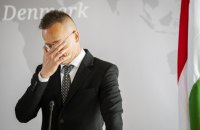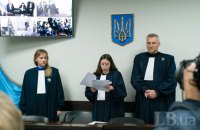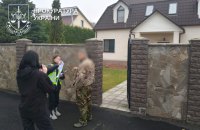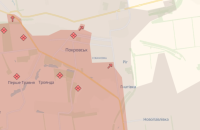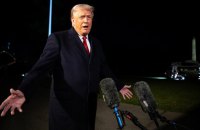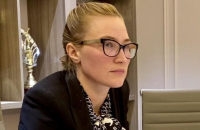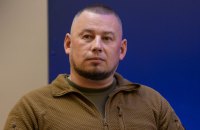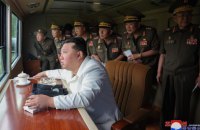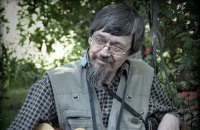Agriculture and truck haulage are most sensitive issues in EU talks – Prime Minister of Ukraine
Ukrainian Prime Minister Mykola Azarov said the Free Trade Agreement with European Union (EU) is 90 per cent ready.
Azarov said however that the remaining unsettled issues are the most sensitive to Ukraine. Among those Azarov named EU requirement to set quotas to Ukrainian agriculture products and position regarding Ukrainian motor carriers entering the EU market. Azarov said Ukraine will protect its interests on these positions. “Of course, Ukraine does not need a free trade deal at any cost. The deal shall meet the interests of Ukrainians”, – he said. He also added that the quotas that EU is offering now are not consistent with Ukraine's potential. “We make this deal not for one or two years but for tens of years, and that is why we need to think of perspectives. The approach not to allow Ukrainian agriculture products to European markets has no perspective”, - Azarov said adding that Ukrainian carriers also expect equal conditions of work at the European markets.
We recall that earlier the head of the EU negotiating group on free trade area, Philippe Cuisson, said the Ukraine-EU Free Trade Agreement would be signed in 2011.
At the same time, M.Azarov said that an agreement on creating a free trade area with the Commonwealth of Independent States (CIS) can be signed in May 2011. The Prime Minister emphasized that the CIS was Ukraine's principal trading partner. “We see that the CIS states are the key market for selling our products”, - he said. The head of the government added that trade between Ukraine and the CIS has experienced a 40-percent rise in 2010. “Ukraine is especially happy about the growth of trade with Russia, which was estimated at 41.5bn dollars in 2010”, - M.Azarov added.
For his part, Ukrainian Foreign Minister Kostyantyn Hryshchenko said that Ukraine would not hold talks on joining the Customs Union between Russia, Belarus and Kazakhstan, as it was already negotiating an agreement on setting up a free trade area with the EU.
The International Monetary Fund might grant Ukraine another tranche of the loan in March 201
The International Monetary Fund (IMF) will consider granting Ukraine another 1.6bn-dollar tranche of the loan at the beginning of March 2011, its resident representative in Ukraine, Max Alier, said.
It was previously reported that an IMF delegation paid a visit to Ukraine on 1-11 February 2011 to hold talks on the second assessment of the program implementation under the Stand-by Arrangement. During the talks, the Ukrainian party succeeded in striking an agreement on a more gradual increase in gas rates for the population. However, the IMF insisted that Ukraine adopt pension reform as soon as in March 2011.
Alier also said that Ukraine does not pay the due attention to the issue of development and improvement of business climate. According to Alier, regardless of the fact that macroeconomic indicators look positively, Ukraine still has problems in a number of sectors related to tax law, customs issues, non-transparent distribution of quotas for agricultural products, etc. “This is what people complain about and this is what sets up the business environment which is not improving but becoming even worse. This is everybody's concern as Ukraine is a country of large potential”, - Alier said.
The European Commissioner for Enlargement and European Neighbourhood Policy, Stefan Füle, said earlier that the European Business Association (EBA) positively assessed changes in Ukraine's business climate. Füle said that he met EBA members in Ukraine and their assessment of the recent changes in business climate is positive.
A Ukrainian delegation headed by Foreign Minister pays a visit to the US
On 13-17 February 2011, a Ukrainian delegation headed by Foreign Minister Hryshchenko paid a visit to the US.
During the visit, it participated in the third session of the US-Ukraine Strategic Partnership Commission (SPC).
Ukraine and the US reached several intergovernmental agreements at the SPC meeting. In particular, the governments of the two states signed a Memorandum of Understanding that pertains to unconventional gas resources. The goal of the Memorandum is to ensure the conditions for exchanging best practices and technical advances between Ukraine and the US in the area of assessment and classification of the Ukrainian shale gas resources.
Later, in a joint statement on the outcomes of the SPC work, the Ukrainian party reaffirmed the commitment, which it undertook during the nuclear summit, to remove the remaining highly-enriched uranium from its territory before 2012. For its part, the US confirmed that it would continue providing Ukraine with financial and technical aid worth approximately 50m dollars till 2012. This includes funding and assisting with the construction of the infrastructure necessary for the development of peaceful nuclear cooperation.
The US and Ukrainian parties also discussed the situation with democracy in Ukraine.
In particular, Secretary of State Hillary Clinton urged the Ukrainian government to seek mutual understanding and common interests with representatives of the Ukrainian civil society and to strengthen democratic institutions. The co-chair of the Congressional Ukrainian Caucus, Marcy Kaptur, said that members of the US Congress were concerned about the state of political liberties in Ukraine. “In the last survey conducted by Freedom House, Ukraine moved from the category of 'free' to 'partially free' states. This has to do with the pressure on media and suppression of freedom of speech, with manipulations in the judicial system and the dishonestly held elections. These problems particularly worry the U.S. Congressmen, and the fact that Freedom House downgraded Ukraine serves as serious evidence of the deteriorating situation”, - she said.
For his part, Hryshchenko said that selective justice did not exist in Ukraine. He added that it was necessary to signal to the society that no one was immune, if one was asked to report about his actions. He also noted that democratic processes in Ukraine were in need of broad international support and for this reason the Ukrainian government counted on active dialogue with Freedom House and other public organizations. Additionally, Hryshchenko said that Ukraine relied on the US support to achieve its ambitious plans on the path to the EU integration.
Ukrainian National Bank Recommends CIS Countries Currencies for Trade Settlements
The National Bank of Ukraine (NBU) has sent a telegram to commercial banks recommending them using CIS countries' currencies for trade settlements In particular, the NBU recommends the authorized banks to offer their clients considering a possibility for using national currencies of the CIS member countries in trade transactions.
According to the NBU, an active use of national currencies in settlements in export and import operations may reduce business entities' transactional costs, it cuts the domestic economy's needs in foreign currency and relieves pressure on Ukrainian hryvnya exchange rate.
We recall that the NBU First Deputy Chairman of Board Yuriy Kolobov said that the national bank was intended to make Russian rouble part of the national monetary reserve. Kolobov said that currency basket diversification will help reducing national economy's dependence on the dollar rate.
“Naftohaz Ukrayiny” Chairman Yevhen Bakulin said earlier that Ukraine was considering making part of payments for Russian gas in roubles.
A criminal case launched against former Deputy Minister will be heard in court in the near future. He is confident in his innocence
The Ukrainian Prosecutor-General's Office (PGO) said that the criminal case opened against Yevhen Korniychuk would be sent to a court. Former Justice Deputy Minister Korniychuk is certain that he will be able to prove his innocence.
It was previously reported that Korniychuk was arrested on 24 December 2011 and accused of office abuse. Later, on 15 February 2011, he was released upon signing a written undertaking not to abscond.
Acording to several Ukrainian politicians and experts, Korniychuk's political prosecution could be used to put pressure on the head of the Ukrainian Supreme Court, Vasyl Onopenko, since Korniychuk is his son-in-law. It is worth mentioning that prior to his release from custody, Onopenko had a meeting with President Vikor Yanukovych, during which they discussed the issues of further reforms in the judicial system, the activity of the Supreme Court, and further steps for improving the work of the judiciary.
At the beginning of February 2011, a criminal case was opened against Onopenko's youngest daughter over fraud. This case was also closed after the meeting between the president and the head of the Supreme Court.
Onopenko believes that the recent developments, which involve his family members, are linked to his activity as the head of the Supreme Court. “Their rationale is simple and understandable. In order to gain full control over the judiciary, one must gain full control over the Supreme Court. To gain control over the Supreme Court, it is necessary to get rid of Onopenko”, - he said.
According to Member of Parliament (MP) Svyatoslav Oliynyk, the authorities are trying to prevent Onopenko from communicating with international organizations. “As you know, he has international diplomatic functions and represents the state judicial system in international institutions. His opinion affects and shapes opinion about Ukraine. The authorities do care about what kind of opinion the European institutions maintain since they keep their assets, money and children abroad, in particular, in Europe”, Oliynyk said.
It was previously reported that Korniychuk is also the leader of the Ukrainian Social-Democratic Party, which is part of the Yuliya Tymoshenko Bloc (YTB). He is not the only leader of an opposition party against whom a criminal case has been launched. For instance, the former interior minister, the leader of the People's SelfDefense party, which is part of the Our Ukraine alliance, Yuriy Lutsenko, was arrested and is currently in the remand centre. Two criminal cases were also opened against the leader of the All-Ukrainian Union Fatherland, Y.Tymoshenko.
The government persecutes the families of the opposition – the YTB
The Batkivschyna party and the parliamentary faction YTB-Batkivschyna said that the law-enforcement bodies started persecuting relatives of the opposition.
In particular, the wife of YTB MP Ruslan Lukyanchuk was summoned for questioning. The 77-year-old mother of the former head of the State Treasury, Tetyana Slyuz, was also called in for questioning. A member of the Kiev council, Vladyslav Yartsev, was detained in connection with graft on 18 February 2011. It is to mention that he is married to a sister of the head of the YTB parliamentary faction, Andriy Kozhemyakin.
Odessa freight carriers accuse customs officials of blocking the work of ports and bribe extortion
The Odessa freight carriers and businessmen who work at the Odessa and Illichivsk ports said that the officials in charge block the work of the ports and demand bribes.
The head of the trade union of freight carriers, Dmytro Okhrymchuk, said that the customs officials have gathered all the freight carriers to explain that it was necessary to pay even more so vehicles did not remain in the ports forever. “To make sure that no one doubts this, they hinted that it was an order from the top”, - he said. Acording to him, the regular, so-called unofficial payments for the transit of cargo saw an increase by 200-500 dollars for every shipping container. The representative of the freight forwarding company Mallati, Vitaliy Makeyev, clarified that the Odessa sea port custom officials demanded bribes on behalf of President Yanukovych.
As it was previously reported, there were over 9,000 shipping containers in the Odessa Region ports as a result of delays in passing the customs control. The Odessa freight carriers said that they intended to stage a protest and take it to the streets if the situation were not resolved in the near future.
The customs officials categorically deny all the accusations from the Odessa freight carriers. They explain that the delays are caused by checks of the Security Sevice of Ukraine (SSU) that significantly slow down the transit of the cargo.
At the same time, as a result of the problems with cargo, exporters change their routes of product deliveries, leaving Ukraine and taking their products to the ports of neighboring countries.
Nord Stream won't reduce gas transit through Ukraine – Aleksei Miller
Gazprom Chairman Aleksei Miller said that the start of gas supply through the Nord Stream pipeline does not imply reducing transit of gas through Ukraine and Belarus.
“We do not put the issue like this. The supply (of gas through Nord Stream ) will be arranged under new contracts”, - Miller said adding that the construction of Nord Stream is due to finish in May, so test supply of gas through the pipeline will be started as early in spring 2011. Miller said that gas will be supplied under longterm contracts and purchased by Gazprom's traditional partners in Europe.
We recall that the Nord Stream gas line connects Russia to the EU on the Baltic Sea bottom. The project is managed by the Russian company Gazprom and German companies E.Оn and BASF.
Exxon Mobil Corporation will operate in Ukraine
The national joint-stock company Naftohaz Ukrayiny and Exxon Mobil Corporation reached an agreement on cooperation.
The companies signed a Memorandum of cooperation to explore unconventional hydrocarbon deposits in Ukraine.
The goal of the Memorandum is to establish mutually beneficial cooperation between the companies in the assessment of the potential deposits of methane, coal, shale gas, tight gas and other unconventional hydrocarbons in Ukraine.
Eastern Partnership Programme is deemed in Ukraine as ineffective
Ukrainian Parliament Speaker Volodymyr Lytvyn considers the Eastern Partnership Programme not being effective.
“I am deeply convinced that the establishment of the Eastern Partnership Programme is taking too long. We have an impression that the neighbourhood policy has been changed to the Eastern Partnership Programme to create sort of a reservation for the countries which geographically, mentally and historically belong to Europe. I am first of all talking about Ukraine”, – Lytvyn said.
Lytvyn hopes that the Eastern Partnership Programme will work more effectively during Poland's presidency in the EU. “This process, I mean the Eastern Partnership, already needs brining back to life, not even started working. We hope, we believe and expect that under Poland's presidency in the EU this programme starts working”, – Lytvyn said.
We recall that the Eastern Partnership Programme comprises six countries, namely Ukraine, Georgia, Armenia, Azerbaijan, Moldova and Belarus and was approved at EU summit on 20 March 2009.
The Ukrainian envoy to Belarus says he did not attend Alyaksandr Lukashenko's inauguration ceremony
The Ukrainian Ambassador to Belarus, Roman Bessmertnyy, denied that he had represented Ukraine during the inauguration ceremony of Belarusian President Alyaksandr Lukashenko.
“I acted the same way that both citizen Bessmertnyy and a Ukrainian Ambassador would act. I did not go there”, - he said. Bessmertnyy also opined that Ukraine could not and would never support those steps that have been taken by the Belarusian authorities for crushing the opposition protests. “This goes beyond the European, Christian and Ukrainian values. There are no such economic, financial, property or banking interests that can be traded for human rights. Such a price does not exist”, - he said.
Previously, media reported that Bessmertnyy had represented Ukraine during Lukashenko's inauguration on 21 January 2011.
As we know, the EU diplomats boycotted Lukashenko's inauguration to protest against the undemocratic crack down on the actions of the opposition.
Commenting on Bessmertnyy's statement, Foreign Minister Hryshchenko said in parliament that diplomatic etiquette did not allow official representatives of Ukraine to make such statements on their behalf.
According to MP Andriy Shkil of the YTB, Hryshchenko's words provide evidence that Bessmertnyy has been dismissed from his position.
MP Taras Chornovil thinks that Bessmertnyy's harsh statement, if he really made it, had most likely received an approval. According to him, the statements by Bessmertnyy and Hryshchenko could be a certain diplomatic game.
Ukraine refuses to support Europe in a critical resolution against Belarus
Ukraine did not support a critical resolution that Europe has issued against Lukashenko.
Prime Minister Azarov refused to join the six European government leaders (representing Hungary, Poland, Slovakia, the Czech Republic, Germany and Austria) who condemned human rights violations in Belarus in their joint statement.
Azarov explained this by the fact that Ukraine had little time to work with the content of the resolution, while, according to him, such documents required a certain procedure for their consideration. At the same time, he expressed concern about the situation in Belarus. Azarov added that Ukraine had its own methods and means to convey its position to the Belarusian authorities.
A political analyst of the Institute for Euro-Atlantic Cooperation, Volodymyr Horbach, believes that it is more important for Azarov and President Yanukovych to retain partnership with Lukashenko. “Ukraine benefits more from withholding its support for such statements rather than from endorsing them. There are a lot of joint Ukrainian-Belarusian projects here, including the one with Venezuelan oil, to refrain from such statements', - he said.
It was previously reported that the open joint-stock company Ukrtransnafta and the closed joint-stock company Belarusian Oil Company signed a two-year contract on the guaranteed transit of 4m tons of oil a year to the Belarusian oil refinery in Mozyr through the Ukrainian oil and gas transport system using the Odessa-Brody pipeline.
The Odessa Portside Factory will not be privatized in 2011 – the State Property Fund of Ukraine
The head of the Ukrainian State Property Fund (SPF), Oleksandr Ryabchenko, said that the privatization of the Odessa Portside Factory (OPF) might not take place in 2011.
According to him, there might not be enough support at present for taking a decision on the plant privatization.
The Ukrainian company Nortima bought the control stake (99.7 percent) of the company for 0,63 bn dollars. The Russian company Azot-Servis and the Ukrainian company Frunze-Flora also bidded for the tender.
Later, the SPF decided not to announce the Nortima company the winner of the tender for the plant privatization based on the fact that the plant was sold for a deflated price.
The plant is the second largest producer of ammonia and urea and the third largest manufacturer of nitrogen fertilizers in Ukraine. It specializes in the synthesis of chemical substances, which are supplied from the CIS countries for export. The plant has a monopoly in the state market of specialized services of ammonia removal, refrigeration and synthesis.
RUSSIA-UKRAINE-EU: PROSPECTS FOR MUTUAL RELATIONS – ROUND TABLE
The Gorshenin Institute held a round-table discussion Russia-Ukraine-EU: Prospects for Mutual Relations on 17 February 2011 in the framework of the Project “Viktor Yanukovych's First Year of Presidency. Conclusions”.
The member of the European Parliament, co-chairman of the joint parliamentary committee on EU - Ukraine cooperation, Pawel Kowal, in his written comments to Gorshenin Institute said that the recent events in Ukraine do not move the country closer to the EU. Kowal said that the EU and especially some members of the European Parliament are particularly concerned watching the developments in Ukraine. Kowal said that a lot of information appeared recently showing Ukraine's drift towards the Russian model of “sovereign democracy”. He did not rule out that the serious work and achievements that Ukrainians have made over the past few years may be ruined. In particular, Kowal told about European politicians' concerns and disappointment with the Ukrainian Prosecutor-General's Office ban to the leader of the Batkivschyna party, Yuliya Tymoshenko, to visit Brussels. “Lack of credibility may pull down Ukraine to lower league of countries which are subject of constant worriment from the UE side. We already had a yellow light: Freedom House rated Ukraine as a partly democratic country” – Kowal said.
Nico Lange, the head of office of Konrad Adenauer Foundation in Kiev, said that Ukraine-EU relations have passed three phases over the last year. First phase was the expectation that the President will proceed with the course for European integration. “The new government had a huge credit of trust”, Lange said. On the second phase, Lange said, EU realized that declamations made by the Ukrainian government do not fit with its actions. Lange said that having the pro-presidential majority in the parliament would allow to solve fairly quickly a number of issues that now hamper Ukraine's integration with EU. This is the very phase when European politicians started making their judgments about Ukraine. Lange also said that as of today the relations between Ukraine and the EU passed to the third phase which is the most dangerous. Today, European politicians start speaking openly about the problems with democracy in Ukraine and this fact adversely affects the process of integration. Lange stressed that no-one knows about the future now, but it is absolutely clear that one year ago many politicians in Europe expected a better situation than what we have know.
The senior advisor of the Russian embassy in Ukraine, Viktor Kochukov, called on Ukrainians to stop dreaming about European integration but rather integrate with Russia. Kochukov said this was clear that the issue of Ukraine's accession to EU is not on the agenda for the next 10-20 years. “This is the fact, and all the rest is fantasies”, - Kochukov said. Kochukov said, however, that Ukraine has to decide for itself, as the world becomes global and united. He called on treating the issue from the standpoint of rationalism. “Either we start integrating with Russia or we continue dreaming of entering the EU in some 10 or 20 years”, - Kochukov said. He added that the EU is interested in Ukraine's agricultural sector, while Russia is more interested in Ukraine's industrial sector. That is why Kochukov considers ties with Russia to be more beneficial to Ukraine. “Ukraine's industrial future, if it ever happens, only becomes possible in integration with Russia”, - Kochukov said adding that both Russia and Ukraine have to develop mutually beneficial ties with the EU. Kochukov is certain, however, that it is better to combine the efforts. “If Ukraine were together with Russia, the negotiations would be absolutely different. They are trying to impose own position on a weak partner while trying to reach a deal with a stronger partner, - the Russian diplomat said.
Razumkov Centre Deputy Director General Valeriy Chalyy says Ukraine will not change its foreign politics course towards European integration. “The process of the European integration is irreversible. It may be long and painful, but it is irreversible”, - he said. Chalyy stressed that the course to European integration is clearly expressed in the Ukrainian legislation and international agreements, so today we can only speak about the timeframes and ways for Ukraine's European integration. Chalyy said that the Ukraine - EU relations agenda was established by the former Ukrainian government. “What was defined in 2007-08, now it is being implemented”, - Chalyy said. He also said that the association agreement will be signed in 2011 during Poland's presidency in the EU. “This will still take several years, but the implementation period will bring us closer to the EU”,- Chalyy said.
Assistant Professor of Kiev Institute of International Relations Serhiy Kozyakov supported the opinion that the problems on Ukraine's way towards the EU are predominantly of technical nature. Kozyakov said that there are very few people in Ukraine who know for sure what the Free Trade Area and World Trade Organization are. “There are maybe 20 people like that”, - he said. Kozyakov said that the issue of singing the free trade agreement with EU is managed by Deputy Minister of Economic Development and Trade Valeriy Pyatnytskyy, who previously was in charge of Ukraine's accession to WTO.
